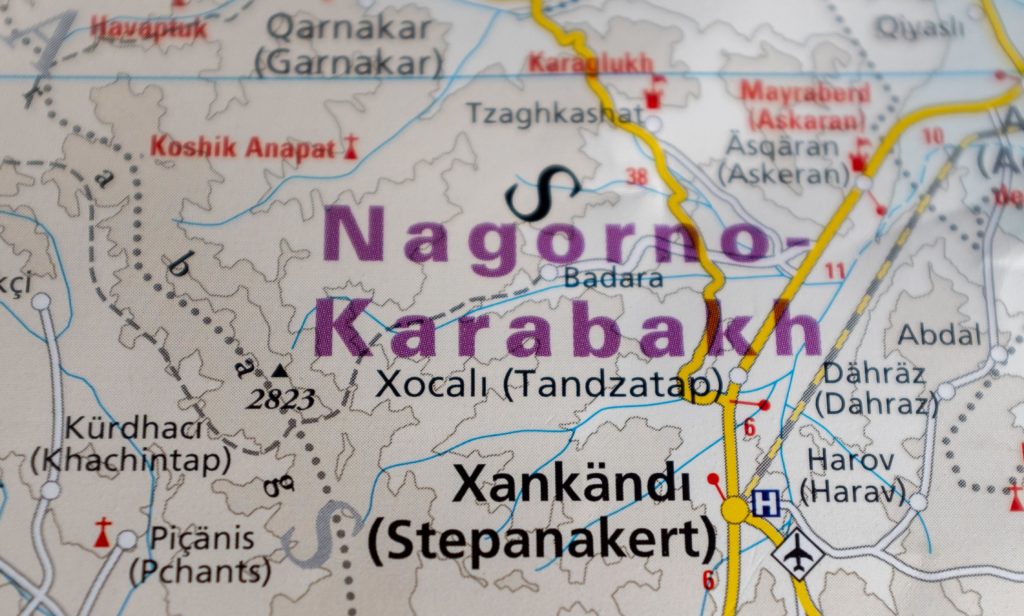BAKU
By Lada Yevgrashina
Armenia and Azerbaijan traded good will gestures, with each side releasing the other’s prisoners less than a week after the two countries’ leaders registered progress in repairing relations damaged by two calamitous conflicts over three decades.
In 44 days of conflict last year, Azerbaijani scored major gains in “deoccupying” areas in and around the region of Nagorno-Karabakh held for three decades by Armenian forces – particularly the city of Shusha, considered Azerbaijan’s cultural capital. Armenia occupied large swathes of territory in the first Karabakh war, coinciding with the collapse of Soviet rule, and evicted ethnic Azeris from the area.
The tone between the two neighbours has become remarkably upbeat after last week’s discussions between Azerbaijani President Ilham Aliyev and Armenian Prime Minister Nikol Pashinyan appeared to remove some of the obstacles to establishing transport links across each other’s territory.
Also on the agenda before the neighbours can clinch a peace settlement is the demarcation of borders dating from the Soviet era.
Second summit in two months
It was the second time the two men had met in less than a month – in late November they held talks in the Russian resort of Sochi, hosted by Kremlin leader Vladimir Putin.
On Monday, Armenia announced it had released and returned home – with the help of Russian mediators — two Azerbaijani servicemen who had been detained on its side of the border on 18th December. Azerbaijan confirmed the return of the two men and said they had become disoriented in bad weather in the Lachin district.
A day earlier, Azerbaijan released 10 Armenian prisoners of war, a move welcomed by European Council President Charles Michel, who hosted last week’s talks.
“An important humanitarian gesture demonstrating the mutual will to strengthen confidence as discussed in Brussels,” Michel tweeted.
Prior to the Brussels meeting, Azerbaijan had released another 10 detainees, prompting Armenia to hand over a map of one of the many areas still affected by lethal land mines.
Armenian leader pledges to build on talks
As the latest exchange took place Pashinyan issued a conciliatory statement praising the two summits held with Aliyev in quick succession.
“After the meetings in Sochi and Brussels, I see an opportunity that we can move forward step by step to open an era of peaceful development for our country and the region,” the Armenian government quoted him as saying at a meeting with senior security officials.
Pashinyan said his government would do everything “in its power to make progress in this direction”.
The two sets of talks highlighted a marked improvement in discussions after nearly three decades of a system of negotiations that produced no clear results.
Michel’s account of the Brussels talks said both men had taken steps to “ensure the de-escalation of tensions”.
The disputed communication links lie at the heart of the talks — the talks have focused on a rail and road link between Azerbaijan and its exclave of Nakhchivan passing through Armenian territory and known as the Zangezur corridor — and a road link between Armenia and Nagorno-Karabakh passing through Azerbaijani territory and known as the Lachin corridor.
Nagorno-Karabakh, the focus of much of the dispute, has been recognised internationally for decades as part of Azerbaijan, though the region has a significant ethnic Armenian community.
The agreement appeared to have been reached in Brussels on the rail route to Nakhchivan and Aliyev said a similar agreement on a road connection along that route was in the making — though Armenian assent seemed far from certain.
Pashinyan acknowledged last week that both sides had agreed to revive the Soviet-era rail link between Azerbaijan and Nakhchivan “to operate in accordance with the accepted international rules of border and customs controls”. Armenia, he said, would have direct contacts with Iran and Russia.
But on his Facebook page, the Armenian prime minister had denounced as “unacceptable” Azerbaijani proposals to set up comparable legal regimes for the two corridors. Armenia has long rejected Azerbaijani customs checks along the corridor to Nakhichivan – on grounds that Armenia’s Megri district to be used In the link would have “transnational” status.
Russia brokered last year’s cease-fire after the six-week conflict and dispatched a 2,000-strong peacekeeping force that remains in place to prevent any new outbreaks of hostilities.
The outcome of last year’s fighting has strengthened the position of Azerbaijan in the region and dealt a blow to the authority of Pashinyan, blamed for the losses on the battlefield. But Pashinyan still managed to secure re-election by a landslide in a snap poll last June.
Armenia has also been seeking improved relations with its historic rival, Turkey, with mistrust dating back to the mass killing of ethnic Armenians by Ottoman Turks in 1915-1916.
Turkish Foreign Minister Mevlüt Çavuşoğlu told reporters in Ankara that recently-appointed representatives of Turkey and Armenia could meet soon as part of efforts to normalise relations between the two countries.
Ankara has long-established cultural and linguistic links with Azerbaijan and played a major role in providing military support for authorities in Baku in last year’s conflict with Armenia.

